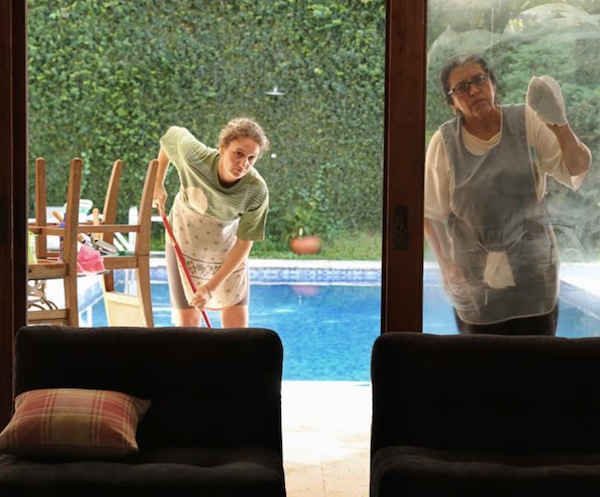Film Review: “The Second Mother” — A Sensitive Study of Class Consciousness in Brazil
The actors draw you in, so there is no need for extraneous exposition as the film carefully examines the ironies of the Brazilian class system.
The Second Mother, written and directed by Anna Muylaert. Now playing at the Kendall Square Cinema.

A scene from “The Second Mother.”
By Tim Jackson
Writer and director Anna Muylaert’s quiet, elegant new film The Second Mother looks at the dynamics of class and society in Brazil through the interactions of a wealthy family, their maid, and her daughter, whose visit upsets the social balance. In the larger cities of Brazil social differences are visible and significant. In São Paulo, where this film is set, five social classes are noticeably evident. Sociologically, Brazil classifies members of society from A (highest) to E (lowest). The categories are determined by educational level, occupation, geographic location, and skin color. These calibrations are carefully woven into a story that is also about what it means to be family.
Regina Calé plays Val, the faithful and devoted maid to Barbara (writer/actress Karine Teles) her husband Carlos (real life underground comic artist Lourenço Mutarelli) and their son Fabinho (Michel Joelsas). Everybody gets along just fine as long as Val knows her place. She’s comfortable being a maid, proud of her attention to detail in attending rigorously to the family’s routine and protocol. Val especially dotes on Fabinho, whom she coddles and protects. He adores her. His parents are hip and liberal minded, though not particularly nurturing. That’s Val’s role.
That formal social contract is tested when Val’s daughter Jéssica (Camila Márdila), left at home for ten years so that Val could send back money for her support, comes to visit while applying to a University in São Paulo. The scenes between Márdila and Regina Calé are whimsical and heartfelt. These two marvelous actresses have terrific chemistry. Jéssica’s expressions of mild disdain at her mother’s deference to the proprieties of social class and Val’s self-conscious attentiveness to her domestic position and obvious nervousness at Jéssica’s improprieties are subtle and convincing.
The social boundaries are easily rattled. For example, servants, regardless of whether they are treated like “family,” are not allowed to swim in the pool or to sit at the table. These social rules are not accepted by the intelligent and curious Jéssica. Once the latter takes liberties, Barbara’s superficial amiability breaks down into a permanent scowl. The father, Carlos, is a weak man, a talented but lazy painter. Still, the family’s money comes from his inheritance, and he uses that as a means of control. “My father made a lot of money,” he asserts. “Everyone dances, but I’m the DJ.” As gentle as he seems, Carlos symbolizes the worst aspects of bourgeois indifference and moral laxity.
Until The Second Mother, Anna Muylaert directed and wrote for Brazilian television. Her sense of how to frame an image and when to move the camera is deliberate and precise. Careful compositions and repeated images, such as the return to an empty staircase and hallway or to the layered interiors of the family’s well-appointed modern home, become in her hands quiet indicators of shifting family relationships. Her patient direction gives viewers time to interpret the cues. The camera moves and/or cuts away only when necessary. The actors draw you in, so there is no need for extraneous exposition as the film carefully examines the ironies of the class system. It is a film that also speaks beyond its own borders, examining the perversities of power, both in terms of personal relationships and the intractability of social inequality.
Tim Jackson is an assistant professor at the New England Institute of Art in the Digital Film and Video Department. His music career in Boston began in the 1970s and includes some 20 groups, many recordings, national and international tours, and contributions to film soundtracks. He studied theater and English as an undergraduate and has also has worked helter skelter as an actor and member of SAG and AFTRA since the 1980s. He has directed a trio of documentaries: Chaos and Order: Making American Theater about the American Repertory Theater, and Radical Jesters, which profiles the practices of 11 interventionist artists and agit-prop performance groups. His third documentary When Things Go Wrong is about the Boston singer/songwriter Robin Lane, with whom he has worked for 30 years. He is a member of the Boston Society of Film Critics. You can read more of his work on his blog.
